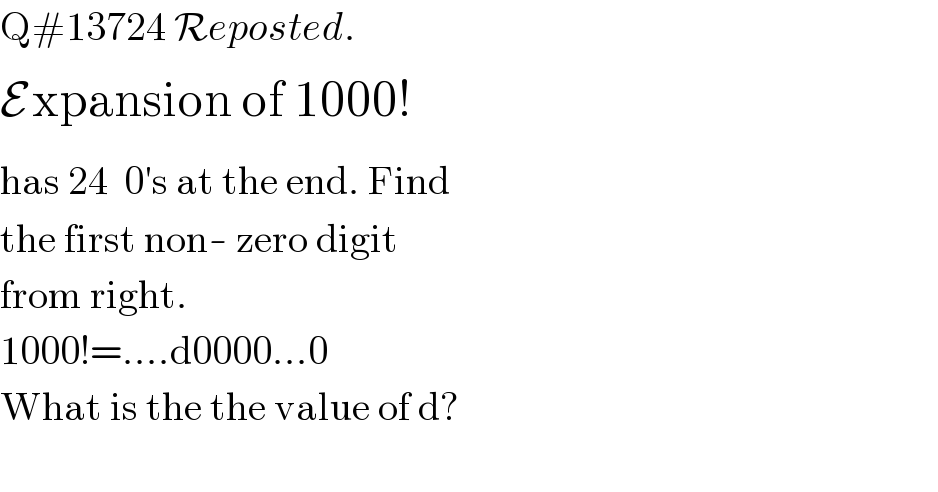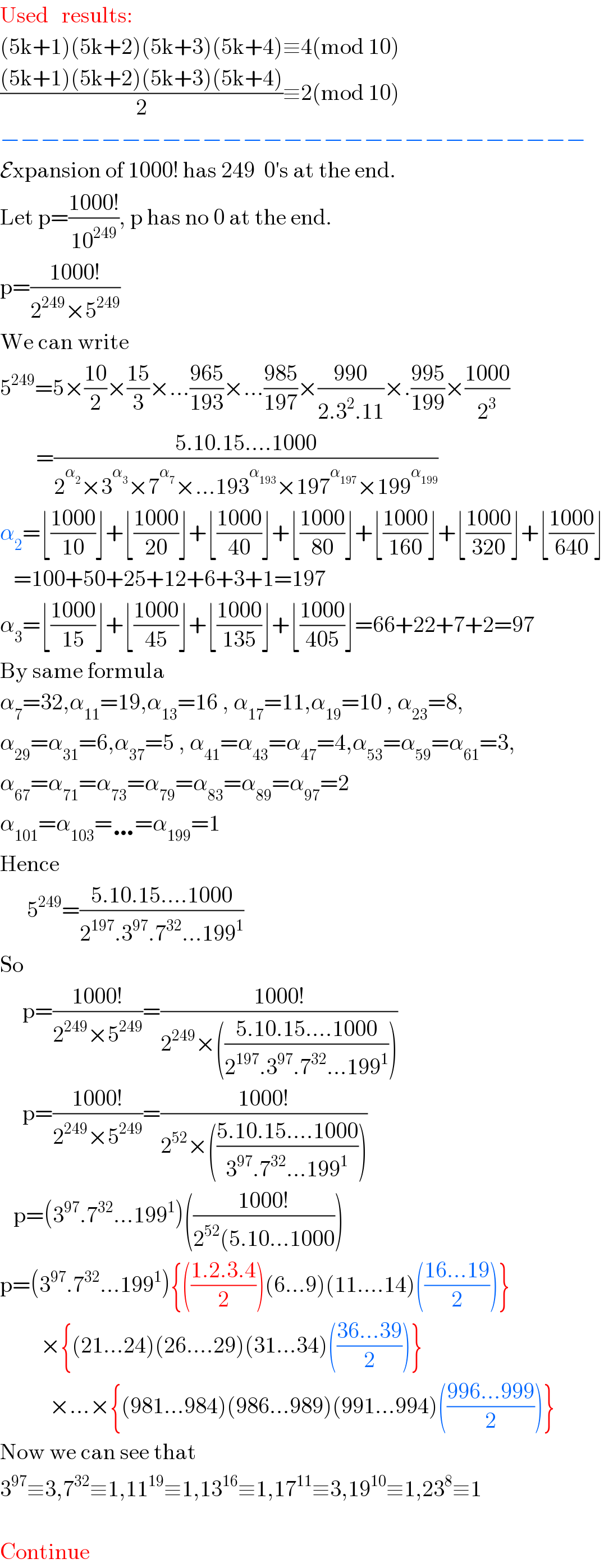Question Number 15543 by RasheedSoomro last updated on 11/Jun/17

$$\mathrm{Q}#\mathrm{13724}\:\mathcal{R}{eposted}. \\ $$$$\mathcal{E}_{\:} ^{\:} \mathrm{xpansion}\:\mathrm{of}\:\mathrm{1000}! \\ $$$$\mathrm{has}\:\mathrm{24}\:\:\mathrm{0}'\mathrm{s}\:\mathrm{at}\:\mathrm{the}\:\mathrm{end}.\:\mathrm{Find} \\ $$$$\mathrm{the}\:\mathrm{first}\:\mathrm{non}-\:\mathrm{zero}\:\mathrm{digit}\: \\ $$$$\mathrm{from}\:\mathrm{right}. \\ $$$$\mathrm{1000}!=….\mathrm{d0000}…\mathrm{0} \\ $$$$\mathrm{What}\:\mathrm{is}\:\mathrm{the}\:\mathrm{the}\:\mathrm{value}\:\mathrm{of}\:\mathrm{d}? \\ $$$$ \\ $$
Answered by RasheedSoomro last updated on 11/Jun/17

$$\mathrm{Used}\:\:\:\mathrm{results}: \\ $$$$\left(\mathrm{5k}+\mathrm{1}\right)\left(\mathrm{5k}+\mathrm{2}\right)\left(\mathrm{5k}+\mathrm{3}\right)\left(\mathrm{5k}+\mathrm{4}\right)\equiv\mathrm{4}\left(\mathrm{mod}\:\mathrm{10}\right) \\ $$$$\frac{\left(\mathrm{5k}+\mathrm{1}\right)\left(\mathrm{5k}+\mathrm{2}\right)\left(\mathrm{5k}+\mathrm{3}\right)\left(\mathrm{5k}+\mathrm{4}\right)}{\mathrm{2}}\equiv\mathrm{2}\left(\mathrm{mod}\:\mathrm{10}\right) \\ $$$$−−−−−−−−−−−−−−−−−−−−−−−−−−−−− \\ $$$$\mathcal{E}\mathrm{xpansion}\:\mathrm{of}\:\mathrm{1000}!\:\mathrm{has}\:\mathrm{249}\:\:\mathrm{0}'\mathrm{s}\:\mathrm{at}\:\mathrm{the}\:\mathrm{end}. \\ $$$$\mathrm{Let}\:\mathrm{p}=\frac{\mathrm{1000}!}{\mathrm{10}^{\mathrm{249}} },\:\mathrm{p}\:\mathrm{has}\:\mathrm{no}\:\mathrm{0}\:\mathrm{at}\:\mathrm{the}\:\mathrm{end}. \\ $$$$\mathrm{p}=\frac{\mathrm{1000}!}{\mathrm{2}^{\mathrm{249}} ×\mathrm{5}^{\mathrm{249}} } \\ $$$$\mathrm{We}\:\mathrm{can}\:\mathrm{write} \\ $$$$\mathrm{5}^{\mathrm{249}} =\mathrm{5}×\frac{\mathrm{10}}{\mathrm{2}}×\frac{\mathrm{15}}{\mathrm{3}}×…\frac{\mathrm{965}}{\mathrm{193}}×…\frac{\mathrm{985}}{\mathrm{197}}×\frac{\mathrm{990}}{\mathrm{2}.\mathrm{3}^{\mathrm{2}} .\mathrm{11}}×.\frac{\mathrm{995}}{\mathrm{199}}×\frac{\mathrm{1000}}{\mathrm{2}^{\mathrm{3}} } \\ $$$$\:\:\:\:\:\:\:\:=\frac{\mathrm{5}.\mathrm{10}.\mathrm{15}….\mathrm{1000}}{\mathrm{2}^{\alpha_{\mathrm{2}} } ×\mathrm{3}^{\alpha_{\mathrm{3}} } ×\mathrm{7}^{\alpha_{\mathrm{7}} } ×…\mathrm{193}^{\alpha_{\mathrm{193}} } ×\mathrm{197}^{\alpha_{\mathrm{197}} } ×\mathrm{199}^{\alpha_{\mathrm{199}} } } \\ $$$$\alpha_{\mathrm{2}} =\lfloor\frac{\mathrm{1000}}{\mathrm{10}}\rfloor+\lfloor\frac{\mathrm{1000}}{\mathrm{20}}\rfloor+\lfloor\frac{\mathrm{1000}}{\mathrm{40}}\rfloor+\lfloor\frac{\mathrm{1000}}{\mathrm{80}}\rfloor+\lfloor\frac{\mathrm{1000}}{\mathrm{160}}\rfloor+\lfloor\frac{\mathrm{1000}}{\mathrm{320}}\rfloor+\lfloor\frac{\mathrm{1000}}{\mathrm{640}}\rfloor \\ $$$$\:\:\:=\mathrm{100}+\mathrm{50}+\mathrm{25}+\mathrm{12}+\mathrm{6}+\mathrm{3}+\mathrm{1}=\mathrm{197} \\ $$$$\alpha_{\mathrm{3}} =\lfloor\frac{\mathrm{1000}}{\mathrm{15}}\rfloor+\lfloor\frac{\mathrm{1000}}{\mathrm{45}}\rfloor+\lfloor\frac{\mathrm{1000}}{\mathrm{135}}\rfloor+\lfloor\frac{\mathrm{1000}}{\mathrm{405}}\rfloor=\mathrm{66}+\mathrm{22}+\mathrm{7}+\mathrm{2}=\mathrm{97} \\ $$$$\mathrm{By}\:\mathrm{same}\:\mathrm{formula} \\ $$$$\alpha_{\mathrm{7}} =\mathrm{32},\alpha_{\mathrm{11}} =\mathrm{19},\alpha_{\mathrm{13}} =\mathrm{16}\:,\:\alpha_{\mathrm{17}} =\mathrm{11},\alpha_{\mathrm{19}} =\mathrm{10}\:,\:\alpha_{\mathrm{23}} =\mathrm{8}, \\ $$$$\alpha_{\mathrm{29}} =\alpha_{\mathrm{31}} =\mathrm{6},\alpha_{\mathrm{37}} =\mathrm{5}\:,\:\alpha_{\mathrm{41}} =\alpha_{\mathrm{43}} =\alpha_{\mathrm{47}} =\mathrm{4},\alpha_{\mathrm{53}} =\alpha_{\mathrm{59}} =\alpha_{\mathrm{61}} =\mathrm{3}, \\ $$$$\alpha_{\mathrm{67}} =\alpha_{\mathrm{71}} =\alpha_{\mathrm{73}} =\alpha_{\mathrm{79}} =\alpha_{\mathrm{83}} =\alpha_{\mathrm{89}} =\alpha_{\mathrm{97}} =\mathrm{2} \\ $$$$\alpha_{\mathrm{101}} =\alpha_{\mathrm{103}} =\ldots=\alpha_{\mathrm{199}} =\mathrm{1} \\ $$$$\mathrm{Hence}\: \\ $$$$\:\:\:\:\:\:\mathrm{5}^{\mathrm{249}} =\frac{\mathrm{5}.\mathrm{10}.\mathrm{15}….\mathrm{1000}}{\mathrm{2}^{\mathrm{197}} .\mathrm{3}^{\mathrm{97}} .\mathrm{7}^{\mathrm{32}} …\mathrm{199}^{\mathrm{1}} } \\ $$$$\mathrm{So} \\ $$$$\:\:\:\:\:\mathrm{p}=\frac{\mathrm{1000}!}{\mathrm{2}^{\mathrm{249}} ×\mathrm{5}^{\mathrm{249}} }=\frac{\mathrm{1000}!}{\mathrm{2}^{\mathrm{249}} ×\left(\frac{\mathrm{5}.\mathrm{10}.\mathrm{15}….\mathrm{1000}}{\mathrm{2}^{\mathrm{197}} .\mathrm{3}^{\mathrm{97}} .\mathrm{7}^{\mathrm{32}} …\mathrm{199}^{\mathrm{1}} }\right)} \\ $$$$\:\:\:\:\:\mathrm{p}=\frac{\mathrm{1000}!}{\mathrm{2}^{\mathrm{249}} ×\mathrm{5}^{\mathrm{249}} }=\frac{\mathrm{1000}!}{\mathrm{2}^{\mathrm{52}} ×\left(\frac{\mathrm{5}.\mathrm{10}.\mathrm{15}….\mathrm{1000}}{\mathrm{3}^{\mathrm{97}} .\mathrm{7}^{\mathrm{32}} …\mathrm{199}^{\mathrm{1}} }\right)} \\ $$$$\:\:\:\mathrm{p}=\left(\mathrm{3}^{\mathrm{97}} .\mathrm{7}^{\mathrm{32}} …\mathrm{199}^{\mathrm{1}} \right)\left(\frac{\mathrm{1000}!}{\mathrm{2}^{\mathrm{52}} \left(\mathrm{5}.\mathrm{10}…\mathrm{1000}\right.}\right) \\ $$$$\mathrm{p}=\left(\mathrm{3}^{\mathrm{97}} .\mathrm{7}^{\mathrm{32}} …\mathrm{199}^{\mathrm{1}} \right)\left\{\left(\frac{\mathrm{1}.\mathrm{2}.\mathrm{3}.\mathrm{4}}{\mathrm{2}}\right)\left(\mathrm{6}…\mathrm{9}\right)\left(\mathrm{11}….\mathrm{14}\right)\left(\frac{\mathrm{16}…\mathrm{19}}{\mathrm{2}}\right)\right\} \\ $$$$\:\:\:\:\:\:\:\:\:×\left\{\left(\mathrm{21}…\mathrm{24}\right)\left(\mathrm{26}….\mathrm{29}\right)\left(\mathrm{31}…\mathrm{34}\right)\left(\frac{\mathrm{36}…\mathrm{39}}{\mathrm{2}}\right)\right\} \\ $$$$\:\:\:\:\:\:\:\:\:\:\:×…×\left\{\left(\mathrm{981}…\mathrm{984}\right)\left(\mathrm{986}…\mathrm{989}\right)\left(\mathrm{991}…\mathrm{994}\right)\left(\frac{\mathrm{996}…\mathrm{999}}{\mathrm{2}}\right)\right\} \\ $$$$\mathrm{Now}\:\mathrm{we}\:\mathrm{can}\:\mathrm{see}\:\mathrm{that} \\ $$$$\mathrm{3}^{\mathrm{97}} \equiv\mathrm{3},\mathrm{7}^{\mathrm{32}} \equiv\mathrm{1},\mathrm{11}^{\mathrm{19}} \equiv\mathrm{1},\mathrm{13}^{\mathrm{16}} \equiv\mathrm{1},\mathrm{17}^{\mathrm{11}} \equiv\mathrm{3},\mathrm{19}^{\mathrm{10}} \equiv\mathrm{1},\mathrm{23}^{\mathrm{8}} \equiv\mathrm{1} \\ $$$$ \\ $$$$\mathrm{Continue} \\ $$
Commented by tawa tawa last updated on 11/Jun/17

$$\mathrm{Weldone}\:\mathrm{sir}. \\ $$
Commented by RasheedSoomro last updated on 12/Jun/17

$$\mathbb{T}\mathrm{han}\Bbbk\mathrm{s}\:\mathrm{miss}\:\mathrm{tawa}.\:\mathrm{pl}\:\mathrm{see}\:\:\mathrm{also}\:\mathrm{my}\:\mathrm{other}\:\mathrm{answer}. \\ $$
Answered by RasheedSoomro last updated on 12/Jun/17
![NEW APPROACH_(−) (The simplest approach) Used results (5k+1)(5k+2)(5k+3)(5k+4)≡4(mod 10) (((5k+1)(5k+2)(5k+3)(5k+4))/2)≡2(mod 10) 2^(4k+1) ≡2(mod 10) 4^(2k) ≡6(mod 10) −−−−−−−−−−−−−−−−−−−−−−−− Expansion of 1000! has 249 0′s at the end p=((1000!)/(10^(249) )) has no zero at the end. Let f(n)=n! f(1000)=1000!=(1...4)(5...9)...(996...999)(5.10.15...1000) =(1...4)(6...9)...(996...999).5^(200) .(1.2.3...200) =5^(200) (1...4)(6...9)...(996...999)×f(200) f(200)=(1...4)(6...9)...(196...l99)(5.10...200) =5^(40) (1...4)(6...9)...(196...l99)(1.2...40) =5^(40) (1...4)(6...9)...(196...l99)×f(40) f(40)=(1...4)(6...9)...(36...39)(5.10...40) =5^8 (1...4)(6...9)...(36...39)(1.2...8) =5^8 (1...4)(6...9)...(36...39)×f(8) f(8)=(1.2.3.4)(5.6.7.8)(5) =5(1.2.3.4)(6.7.8) f(1000)=5^(200) (1...4)(6...9)...(996...999) ×5^(40) (1...4)(6...9)...(196...l99) ×5^8 (1...4)(6...9)...(36...39) ×5(1...4)(6.7.8) =5^(249) (1...4)^4 (6...9)^3 (6.7.8)...(36...39)^3 ×(41...44)^2 ...(196...199)^2 ×(201...204)...(996...999) p=((f(1000))/(2^(249) .5^(249) )) =((1/2^(249) ))(6.7.8)(1...4)^4 (6...9)^3 (11...14)^3 ...(36...39)^3 ×(41...44)^2 (46...49)^2 ...(196...199)^2 ×(201...204)...(996...999) ={(1...4)(6...9)...(996...999)} =(6.7.8)( =((1/2^(249) )){(1...4)...(36....39)^(8 brackets) }^3 ×{(41...44)...(196...199)^(32 brackets) }^2 ×{(201...204)...(996...999)^(180 brackets) } ×{(1...4)(6.7.8} Total number of brackets =8×3+32×2+180+2=270 Any of 249 brackets could be given 2 as denominator (((∗.∗.∗.∗)/2))≡2(mod 10) [249 congruences] (∗.∗.∗.∗)≡4(mod 10) [ 20 congruences] 6.7.8≡6(mod 10) [ 1 congruence] Multiplying above congruences p≡2^(249•) .4^(20∗) .6(mod 2) ≡2.6.6(mod 10) ≡2(mod 10](https://www.tinkutara.com/question/Q15581.png)
$$\underset{−} {\mathcal{NEW}\:\:\:\:\mathcal{APPROACH}}\:\left(\mathrm{The}\:\mathrm{simplest}\:\mathrm{approach}\right) \\ $$$$\mathrm{Used}\:\mathrm{results} \\ $$$$\left(\mathrm{5k}+\mathrm{1}\right)\left(\mathrm{5k}+\mathrm{2}\right)\left(\mathrm{5k}+\mathrm{3}\right)\left(\mathrm{5k}+\mathrm{4}\right)\equiv\mathrm{4}\left(\mathrm{mod}\:\mathrm{10}\right) \\ $$$$\frac{\left(\mathrm{5k}+\mathrm{1}\right)\left(\mathrm{5k}+\mathrm{2}\right)\left(\mathrm{5k}+\mathrm{3}\right)\left(\mathrm{5k}+\mathrm{4}\right)}{\mathrm{2}}\equiv\mathrm{2}\left(\mathrm{mod}\:\mathrm{10}\right) \\ $$$$\mathrm{2}^{\mathrm{4k}+\mathrm{1}} \equiv\mathrm{2}\left(\mathrm{mod}\:\mathrm{10}\right) \\ $$$$\mathrm{4}^{\mathrm{2k}} \equiv\mathrm{6}\left(\mathrm{mod}\:\mathrm{10}\right) \\ $$$$−−−−−−−−−−−−−−−−−−−−−−−− \\ $$$$\mathcal{E}\mathrm{xpansion}\:\mathrm{of}\:\mathrm{1000}!\:\mathrm{has}\:\mathrm{249}\:\:\:\:\mathrm{0}'\mathrm{s}\:\mathrm{at}\:\mathrm{the}\:\mathrm{end} \\ $$$$\mathrm{p}=\frac{\mathrm{1000}!}{\mathrm{10}^{\mathrm{249}} }\:\mathrm{has}\:\mathrm{no}\:\mathrm{zero}\:\mathrm{at}\:\mathrm{the}\:\mathrm{end}. \\ $$$$\mathrm{Let}\:\mathrm{f}\left(\mathrm{n}\right)=\mathrm{n}! \\ $$$$\mathrm{f}\left(\mathrm{1000}\right)=\mathrm{1000}!=\left(\mathrm{1}…\mathrm{4}\right)\left(\mathrm{5}…\mathrm{9}\right)…\left(\mathrm{996}…\mathrm{999}\right)\left(\mathrm{5}.\mathrm{10}.\mathrm{15}…\mathrm{1000}\right) \\ $$$$\:\:=\left(\mathrm{1}…\mathrm{4}\right)\left(\mathrm{6}…\mathrm{9}\right)…\left(\mathrm{996}…\mathrm{999}\right).\mathrm{5}^{\mathrm{200}} .\left(\mathrm{1}.\mathrm{2}.\mathrm{3}…\mathrm{200}\right) \\ $$$$\:\:=\mathrm{5}^{\mathrm{200}} \left(\mathrm{1}…\mathrm{4}\right)\left(\mathrm{6}…\mathrm{9}\right)…\left(\mathrm{996}…\mathrm{999}\right)×\mathrm{f}\left(\mathrm{200}\right) \\ $$$$\:\:\mathrm{f}\left(\mathrm{200}\right)=\left(\mathrm{1}…\mathrm{4}\right)\left(\mathrm{6}…\mathrm{9}\right)…\left(\mathrm{196}…\mathrm{l99}\right)\left(\mathrm{5}.\mathrm{10}…\mathrm{200}\right) \\ $$$$\:\:\:\:\:\:\:\:\:\:\:\:\:\:\:\:=\mathrm{5}^{\mathrm{40}} \left(\mathrm{1}…\mathrm{4}\right)\left(\mathrm{6}…\mathrm{9}\right)…\left(\mathrm{196}…\mathrm{l99}\right)\left(\mathrm{1}.\mathrm{2}…\mathrm{40}\right) \\ $$$$\:\:\:\:\:\:\:\:\:\:\:\:\:\:\:\:=\mathrm{5}^{\mathrm{40}} \left(\mathrm{1}…\mathrm{4}\right)\left(\mathrm{6}…\mathrm{9}\right)…\left(\mathrm{196}…\mathrm{l99}\right)×\mathrm{f}\left(\mathrm{40}\right) \\ $$$$\mathrm{f}\left(\mathrm{40}\right)=\left(\mathrm{1}…\mathrm{4}\right)\left(\mathrm{6}…\mathrm{9}\right)…\left(\mathrm{36}…\mathrm{39}\right)\left(\mathrm{5}.\mathrm{10}…\mathrm{40}\right) \\ $$$$\:\:\:\:\:\:\:\:\:\:\:\:=\mathrm{5}^{\mathrm{8}} \left(\mathrm{1}…\mathrm{4}\right)\left(\mathrm{6}…\mathrm{9}\right)…\left(\mathrm{36}…\mathrm{39}\right)\left(\mathrm{1}.\mathrm{2}…\mathrm{8}\right) \\ $$$$\:\:\:\:\:\:\:\:\:\:\:\:=\mathrm{5}^{\mathrm{8}} \left(\mathrm{1}…\mathrm{4}\right)\left(\mathrm{6}…\mathrm{9}\right)…\left(\mathrm{36}…\mathrm{39}\right)×\mathrm{f}\left(\mathrm{8}\right) \\ $$$$\mathrm{f}\left(\mathrm{8}\right)=\left(\mathrm{1}.\mathrm{2}.\mathrm{3}.\mathrm{4}\right)\left(\mathrm{5}.\mathrm{6}.\mathrm{7}.\mathrm{8}\right)\left(\mathrm{5}\right) \\ $$$$\:\:\:\:\:\:\:\:\:\:\:=\mathrm{5}\left(\mathrm{1}.\mathrm{2}.\mathrm{3}.\mathrm{4}\right)\left(\mathrm{6}.\mathrm{7}.\mathrm{8}\right) \\ $$$$ \\ $$$$\mathrm{f}\left(\mathrm{1000}\right)=\mathrm{5}^{\mathrm{200}} \left(\mathrm{1}…\mathrm{4}\right)\left(\mathrm{6}…\mathrm{9}\right)…\left(\mathrm{996}…\mathrm{999}\right) \\ $$$$\:\:\:\:\:\:\:\:\:\:\:\:\:\:\:\:\:\:\:\:\:\:\:\:×\mathrm{5}^{\mathrm{40}} \left(\mathrm{1}…\mathrm{4}\right)\left(\mathrm{6}…\mathrm{9}\right)…\left(\mathrm{196}…\mathrm{l99}\right) \\ $$$$\:\:\:\:\:\:\:\:\:\:\:\:\:\:\:\:\:\:\:\:\:\:\:\:\:\:\:\:\:\:×\mathrm{5}^{\mathrm{8}} \left(\mathrm{1}…\mathrm{4}\right)\left(\mathrm{6}…\mathrm{9}\right)…\left(\mathrm{36}…\mathrm{39}\right) \\ $$$$\:\:\:\:\:\:\:\:\:\:\:\:\:\:\:\:\:\:\:\:\:\:\:\:\:\:\:\:\:\:\:\:\:\:\:\:\:\:×\mathrm{5}\left(\mathrm{1}…\mathrm{4}\right)\left(\mathrm{6}.\mathrm{7}.\mathrm{8}\right) \\ $$$$\:\:\:\:\:\:\:\:\:\:\:\:\:\:\:\:=\mathrm{5}^{\mathrm{249}} \left(\mathrm{1}…\mathrm{4}\right)^{\mathrm{4}} \left(\mathrm{6}…\mathrm{9}\right)^{\mathrm{3}} \left(\mathrm{6}.\mathrm{7}.\mathrm{8}\right)…\left(\mathrm{36}…\mathrm{39}\right)^{\mathrm{3}} \\ $$$$\:\:\:\:\:\:\:\:\:\:\:\:\:\:\:\:\:\:\:\:\:\:\:×\left(\mathrm{41}…\mathrm{44}\right)^{\mathrm{2}} …\left(\mathrm{196}…\mathrm{199}\right)^{\mathrm{2}} \\ $$$$\:\:\:\:\:\:\:\:\:\:\:\:\:\:\:\:\:\:\:\:\:\:\:\:\:\:\:\:×\left(\mathrm{201}…\mathrm{204}\right)…\left(\mathrm{996}…\mathrm{999}\right) \\ $$$$\mathrm{p}=\frac{\mathrm{f}\left(\mathrm{1000}\right)}{\mathrm{2}^{\mathrm{249}} .\mathrm{5}^{\mathrm{249}} } \\ $$$$\:\:\:\:\:\:\:\:\:\:\:\:\:\:\:\:=\left(\frac{\mathrm{1}}{\mathrm{2}^{\mathrm{249}} }\right)\left(\mathrm{6}.\mathrm{7}.\mathrm{8}\right)\left(\mathrm{1}…\mathrm{4}\right)^{\mathrm{4}} \left(\mathrm{6}…\mathrm{9}\right)^{\mathrm{3}} \left(\mathrm{11}…\mathrm{14}\right)^{\mathrm{3}} …\left(\mathrm{36}…\mathrm{39}\right)^{\mathrm{3}} \\ $$$$\:\:\:\:\:\:\:\:\:\:\:\:\:\:\:\:\:\:\:\:×\left(\mathrm{41}…\mathrm{44}\right)^{\mathrm{2}} \left(\mathrm{46}…\mathrm{49}\right)^{\mathrm{2}} …\left(\mathrm{196}…\mathrm{199}\right)^{\mathrm{2}} \\ $$$$\:\:\:\:\:\:\:\:\:\:\:\:\:\:\:\:\:\:\:\:\:\:\:\:\:×\left(\mathrm{201}…\mathrm{204}\right)…\left(\mathrm{996}…\mathrm{999}\right) \\ $$$$ \\ $$$$\:\:\:\:\:\:\:\:\:\:\:\:\:=\left\{\left(\mathrm{1}…\mathrm{4}\right)\left(\mathrm{6}…\mathrm{9}\right)…\left(\mathrm{996}…\mathrm{999}\right)\right\} \\ $$$$\:\:\:\:\:\:\:\:\:\:\:\:\:\:\:\:=\left(\mathrm{6}.\mathrm{7}.\mathrm{8}\right)\left(\right. \\ $$$$\:\:\:\:\:\:\:\:=\left(\frac{\mathrm{1}}{\mathrm{2}^{\mathrm{249}} }\right)\left\{\overset{\mathrm{8}\:\mathrm{brackets}} {\left(\mathrm{1}…\mathrm{4}\right)…\left(\mathrm{36}….\mathrm{39}\right)}\right\}^{\mathrm{3}} \\ $$$$\:\:\:\:\:\:\:\:\:\:\:\:\:\:\:\:\:\:\:×\left\{\overset{\mathrm{32}\:\mathrm{brackets}} {\left(\mathrm{41}…\mathrm{44}\right)…\left(\mathrm{196}…\mathrm{199}\right)}\right\}^{\mathrm{2}} \\ $$$$\:\:\:\:\:\:\:\:\:\:\:\:\:\:\:\:\:\:\:\:\:\:\:×\left\{\overset{\mathrm{180}\:\mathrm{brackets}} {\left(\mathrm{201}…\mathrm{204}\right)…\left(\mathrm{996}…\mathrm{999}\right)}\right\} \\ $$$$\:\:\:\:\:\:\:\:\:\:\:\:\:\:\:\:\:\:\:\:\:\:\:\:\:\:\:×\left\{\left(\mathrm{1}…\mathrm{4}\right)\left(\mathrm{6}.\mathrm{7}.\mathrm{8}\right\}\right. \\ $$$$\mathrm{Total}\:\mathrm{number}\:\mathrm{of}\:\mathrm{brackets}\:=\mathrm{8}×\mathrm{3}+\mathrm{32}×\mathrm{2}+\mathrm{180}+\mathrm{2}=\mathrm{270} \\ $$$$\mathrm{Any}\:\mathrm{of}\:\mathrm{249}\:\mathrm{brackets}\:\mathrm{could}\:\mathrm{be}\:\mathrm{given}\:\mathrm{2}\:\mathrm{as}\:\mathrm{denominator} \\ $$$$\left(\frac{\ast.\ast.\ast.\ast}{\mathrm{2}}\right)\equiv\mathrm{2}\left(\mathrm{mod}\:\mathrm{10}\right)\:\:\:\left[\mathrm{249}\:\mathrm{congruences}\right] \\ $$$$\left(\ast.\ast.\ast.\ast\right)\equiv\mathrm{4}\left(\mathrm{mod}\:\mathrm{10}\right)\:\:\:\:\left[\:\mathrm{20}\:\mathrm{congruences}\right] \\ $$$$\mathrm{6}.\mathrm{7}.\mathrm{8}\equiv\mathrm{6}\left(\mathrm{mod}\:\mathrm{10}\right)\:\:\:\:\:\:\:\:\:\:\:\:\left[\:\mathrm{1}\:\:\mathrm{congruence}\right] \\ $$$$\mathrm{Multiplying}\:\mathrm{above}\:\mathrm{congruences} \\ $$$$\mathrm{p}\equiv\mathrm{2}^{\mathrm{249}\bullet} .\mathrm{4}^{\mathrm{20}\ast} .\mathrm{6}\left(\mathrm{mod}\:\mathrm{2}\right) \\ $$$$\:\:\:\equiv\mathrm{2}.\mathrm{6}.\mathrm{6}\left(\mathrm{mod}\:\mathrm{10}\right) \\ $$$$\:\:\:\equiv\mathrm{2}\left(\mathrm{mod}\:\mathrm{10}\right. \\ $$$$ \\ $$
Commented by mrW1 last updated on 12/Jun/17

$$\mathrm{I}\:\mathrm{appreciate}\:\mathrm{very}\:\mathrm{that}\:\mathrm{you}\:\mathrm{never}\:\mathrm{stop} \\ $$$$\mathrm{before}\:\mathrm{the}\:\mathrm{solution}\:\mathrm{is}\:\mathrm{found}! \\ $$
Commented by tawa tawa last updated on 12/Jun/17

$$\mathrm{Wow}\:,\:\mathrm{kudox}\:\mathrm{sir}. \\ $$
Commented by mrW1 last updated on 12/Jun/17

$$\boldsymbol{\mathcal{C}}\mathcal{ONGRATULATION}\:\mathcal{SIR}! \\ $$
Commented by RasheedSoomro last updated on 12/Jun/17

$$\mathcal{TH}\alpha{nks}\:\:\mathcal{SIR}! \\ $$$$\mathcal{A}\:{part}\:{of}\:{your}\:{congratulation} \\ $$$${returns}\:{to}\:{you},\:{because}\:{it}\:{is} \\ $$$${based}\:{on}\:{a}\:{result}\:{proved}\:{by}\:{you}! \\ $$
Commented by mrW1 last updated on 12/Jun/17

$$\mathrm{Can}\:\mathrm{you}\:\mathrm{find}\:\mathrm{the}\:\mathrm{last}\:\mathrm{non}−\mathrm{zero}\:\mathrm{digit} \\ $$$$\mathrm{of}\:\mathrm{2000}!\:\mathrm{using}\:\mathrm{your}\:\mathrm{method}? \\ $$
Commented by RasheedSoomro last updated on 12/Jun/17

$$\mathrm{I}\:\mathrm{think}\:\mathrm{I}\:\mathrm{can}\:\mathrm{sir}. \\ $$
